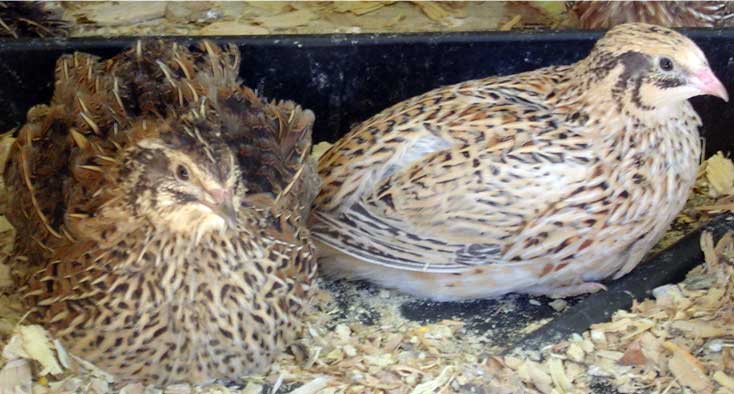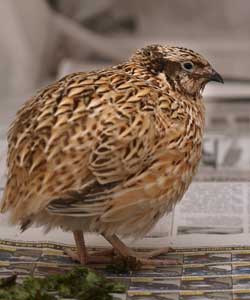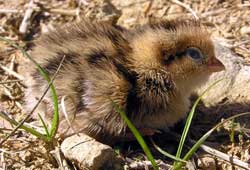Our Processed Quail
Our Quails
Our quail are raised on wire to reduce the risk of parasitic infestation. This also promotes clean healthy feet. They are given non-medicated high protein feed and fresh rocky mountain water. Our birds weigh six ounces and are shipped frozen with dry ice to insure freshness. They have been fasted for 24 hours before harvesting to insure that their crops are empty. We welcome all inquiries, including inquires about raw processed quail for pet food. Please call or email us, for price quotes. Quail are widely recognized for their high nutritional value. They are high in Protein, Vitamin E, Calcium, Copper, Iron, Magnesium, Manganese and Zinc.
Raising Quail
(Image Courtesy of Ingrid Taylar)
Quail are an enjoyment to raise and the space required is minimal as they are small and they don’t eat a very much. They are efficient at converting feed into protein and are much more friendly creatures than even the most tempered chicken. Quail have been raised domestically since the Pharos ruled. The modern Coturnix Quail are bred to begin generating eggs at less than 2 months old. Once the female starts lying; the female hen will produce one egg a day for at least one year. The males grow just as rapid; they’re ready for the table in 6-8 weeks.
Quail eggs are genuinely identical in taste & nutritional value to Chicken eggs. The female hen generally needs less than 2lbs of feed to produce about 1lb of eggs (Chickens need about 3lbs feed to make that same). Because of their lesser size, they’re attractive as hors d’oeuvres, and can be pickled or hard-boiled. Five Quail eggs equal approximate one chicken egg and Quail eggs are quite different in their appearance (Coturnix Quail eggs freckled and spotted).
Quail meat is very delicious; even the breast meat is dark as is true for most birds that fly. The taste is practically identical to chicken. The meat is almost always tender and can be baked, stir-fried , roasted, broiled, or even stewed.
Many Quail breeders prefer raised cages as they are much easier to clean. The droppings fall to the ground and removed for compost. Raised cages also mean the birds will never be standing in manure and the eggs will stay clean. Some kind of nesting or brooding compartment is essential if you access to the eggs. The box should be solid with one small opening for the Quail hens to enter and leave and then another large door for collecting the eggs and also to replace the bedding. Optimally, you want to be able to get to the nesting box from outside the cage. You can easily keep 40+ birds in a single 3′ x 3′ x 7′ cage. The nesting box should be 16” x 3′ x 3′.


 in
in  by
by  January 15, 2013 at 1:00 AM
January 15, 2013 at 1:00 AM 









Comments are closed.